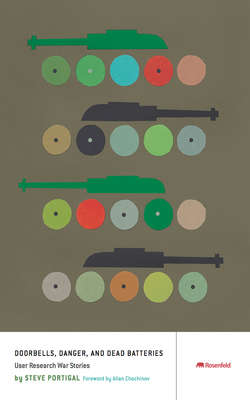Читать книгу Doorbells, Danger, and Dead Batteries - Steve Portigal - Страница 18
На сайте Литреса книга снята с продажи.
Tamara Christensen: What the Hell? Don’t You Knock?
ОглавлениеMy first trip to New Jersey for fieldwork involved two memorable events: a blizzard and a bathroom blitz.
Two days before we departed for New Jersey, I received an email request from my client to rent the biggest SUV available. A huge snowstorm was pounding the Northeast, and he wanted to feel safe as we ventured into the streets and highways of various townships for a week of in-home interviews. I obliged and was glad I did. The evening we arrived, we found the streets covered with snow, and the plows were evidently having trouble keeping up.
I kept getting rescheduling calls from the recruiter. Participants were cancelling because of the weather. This seemed strange, given the fact that we were the ones traveling to their homes, and they didn’t have to go anywhere! It felt like a game of musical chairs as we continually shifted and rescheduled. It was impossible to predict if we would be able to complete the targeted number of interviews during our week-long visit. In fact, it was even difficult to predict if we would be able to leave town at the end of the week because the airport was canceling flights every day.
There were three of us in the field: myself, a videographer, and the client. We all met for breakfast the first morning while the car warmed up. It took 30 minutes to melt the layers of ice that had accumulated overnight on the windshield. Fortunately, the heater had kicked in by the time we all piled into the SUV and headed out for our first interview of the week, giving ourselves ample time to arrive at our destination.
Instead of the 30 minutes suggested by Google Maps, we arrived an hour later at our destination, a narrow residential street of two-story, beige brick duplexes still decorated for the Christmas holiday. Plows had left six-foot tall snowbanks on either side of the street, and cars were parked in tight spaces carved out by the residents. Sadly, it appeared that most of those residents didn’t have an SUV as big as our rental. We circled the area for fifteen minutes before we found a gap large enough to park in.
We were there to interview a young woman in her 20s, a nurse. She welcomed us into the living room where we set up our cameras and found places to sit among her teddy bear collection and her floor-to-ceiling cabinet, which contained an homage to Michael Jackson. Her mother appeared in a short fuzzy black robe. “I’ve been doing focus groups for years. No one ever asked to come to this house before. Why do you want to go to people’s houses?” We explained the nature of our visit and commenced with the interview.
For the first half hour of the interview, the mother came in and out of the room, answering and asking questions and reiterating her concerns about our presence and intentions. Each time, the daughter would suspend her responses to address the interruption, urging her mother out of the room. “We always meet at Dunkin’ Donuts. That’s the place to go . . . MA! They’re here to talk to me. Let me do this!” “I always stop on my way to work to pick up an iced tea . . . MA! Go get dressed already!” “I love those little facts on the lid. They are so cute . . . MA! Enough! Quit interrupting us!” No matter what the daughter said, the mother would return every few minutes to listen and contribute.
I realized shortly into the interview that, in our flurry of inclement travel, I had neglected to honor one of the cardinal rules of interviewing: “Go before you arrive.” I ignored my biological needs as long as I could, but the morning’s coffee didn’t help. I finally had to excuse myself for a restroom break.
“It’s just there in the hall, on the right,” said the nurse, pointing down the mirrored hallway.
I excused myself and walked to the bathroom door. It was open a few inches, so I pushed it. There in the bright pink-and-black tiled bathroom stood the mother, facing the toilet with her little black robe hiked up above the waist, her backside completely exposed.
She turned before I could retreat. “What the Hell? Don’t you knock?” I felt blood rush warmly to my face.
“I’m so sorry,” I said, backing out and closing the door behind (or rather, in front of) me. “I’m so sorry,” I continued, “the door was open. I didn’t realize anyone was in there. I’m so sorry.”
I swiftly returned to the living room.
“I’m so sorry,” I told the nurse. “The door was open a crack, so I just went in, and I walked in on your mother. I am sure I’ve upset her.”
“Ha! Don’t worry. She’ll be fine,” she consoled me. “Maybe she’ll leave us alone now.”
I wasn’t sure I would be fine. I tried to concentrate on the interview, the purpose of our visit, the friendly nurse who gave us a detailed tour of the kitchen drawers. But images of her mother’s bare behind kept flashing in my mind. She was right, sort of, about her mother leaving us alone. For the remaining hour, we didn’t hear a word from the woman, although she kept appearing (now fully clothed) wherever we were. She said nothing. She just looked at me with a glare that felt as icy as the windshield that awaited us outside.
Our first stop was a Dunkin’ Donuts where I was finally able to relieve myself.
